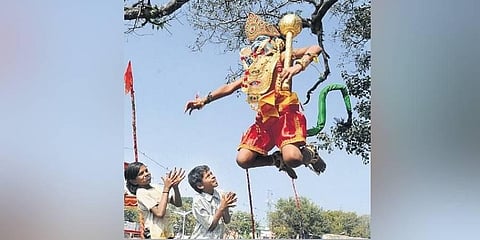

Happy Deepavali, dear readers. While we celebrate Sri Rama’s return, it seems appropriate to think of his greatest devotee, Sri Hanuman. Both north and south are deeply in love with the ‘action hero’ personality of Hanuman. He is also upheld as an ideal of humility and devotion despite being a superstar in his own right.
These qualities are described in the Sanskrit verse, ‘Yatra yatra Raghunatha kirtanam tatra tatra krta-mastakanjalim/vashpavari paripurna lochanam Marutim namata rakshasa-antakam.’ It means, ‘Wherever the glory of Rama is sung, there, with his hands clasped over his bowed head and eyes overflowing with tears, is Hanuman; I salute Hanuman who vanquishes demons’.
Hanuman is considered a nityasuri or one who is free of karma for eternity. He is also believed to be still on Earth to help us in our struggles through life. This belief has gone so deep that wherever the Ramayana is recited or discoursed upon, the organisers quietly place a palaha or wooden board on the stage, a seat of honour reserved for Hanuman. He is thought to be in attendance, although no one can tell in which guise. He won’t actually sit there unless he comes invisibly, they say, but just in case he does, we shan’t be found wanting in respect and affection.
The belief in Hanuman’s protective presence is so cherished that you’ll find people muttering ‘Jai Bajrang Bali’ as their flight takes off or before they hit a rapid in the river or drive up a steep road in the hills. Many across the country seem to know the Hanuman Chalisa and value its significance as a kavacham or protective shield. There are several good versions on YouTube to hear as a daily boost.
Another favourite is the verse, ‘Buddhir balam yasho dhairyam nirbhayatvam arogatam/ajadyam vaak patutvam cha Hanumat smaranat bhavet,’ meaning, ‘By remembering Hanuman, I gain intelligence, strength, a good reputation, courage, fearlessness and good health. I avoid dullness and I become eloquent’. There’s nothing in there about winning lotteries, buying a new car or landing that dream job. Instead, it’s all about ‘personality development’, about wanting to be strong, confident and bright, to achieve tejas or a lustrous character.
It is clearly meant to inspire the reciter to become a positive person and an asset to society. However, to appreciate the personality of Hanuman, whose original name was Sundara, the beautiful one, we must first understand the one he reveres: Rama, whom he loved the moment he saw him. This may be easier said than done. We live in confused times in terms of everyday belief. This is nothing new. I am not a Sanskritist but this line in Verse 60 of Adi Shankara’s book Viveka Chudamani caught my eye. This eighth century verse says, ‘Shabdajaalam mahaaranyam chittabhramanakaaranam.’ The meaning seems so contemporary: ‘Scripture, consisting of many words, is a dense forest which bewilders the mind.’ The verse goes on to say, ‘Hence people should earnestly set about knowing the true nature of reality’ (that all things pass, save God).
Hanuman discovers the spiritual path in a striking way. There is an undiscovered longing in him that lights up when he sees Rama. He does not know who Rama is or what he’s all about. He does not know that Rishi Valmiki asked Sage Narada: “I wonder if there is a single person blessed with all the good qualities one can think of.”
Sage Narada asks Valmiki to list those qualities and Valmiki comes up with integrity, courage, correct behaviour, gratitude, honesty, dedication to one’s principles, concern for all beings, self-control, a tight hold on temper and a lack of jealousy at all times.
“Even the celestials don’t possess all these qualities. Is it possible that a single human being has them?” wonders Valmiki wistfully. “My heart aches to know of such a person.” Narada then tells Valmiki about Rama. He adds that Rama is always pleasant in his speech and manners and that all gentle people gravitate towards him like how all rivers run to the sea, that Rama is patient like Mother Earth and generous like Kubera.
Thus Rama radiates a palpable aura of goodness that Hanuman’s heart instantly responds to. It is his epiphany or what I call his ‘bhidyatey’ moment. This is from a verse in the Srimad Bhagavatam, 1:2:21, which goes: ‘Bhidyateyhrdaya-granthish chidyantey sarva-samshayaah/kshiyantey chaasya karmaani tasmin drshtaevatmanishvarey.’ It means, ‘The knot in the heart is cut away, doubts vanish and struggles cease, when that, the Truth, is seen.’ It leaves one pining for a similar experience and for that perhaps we need to evolve into a person like Hanuman.
But Hanuman, too, had to overcome his ‘Vanara nature’ to refine his character. Two instances come to mind. The first is when he steals into Ravana’s palace and sees him asleep on his golden bed with a beautiful, bejewelled woman by his side. Hanuman thinks he has found Sita and runs up and down a pillar in joy, kissing his tail. But then he realises that it could scarcely be Sita and berates himself for
his foolishness.
The other instance is after he sets fire to Lanka with his burning tail. Only then does he realise that he has risked Sita’s life by doing so. He feels terrible about it. Our ragas, be they Carnatic or Hindustani, have an aitihyam or story behind them. There is such a story in Hindustani music about the raga ‘Lanka Dahan Sarang’. Lanka Dahan means ‘the burning of Lanka’ in Hindi. The raga is said to have been composed by Hanuman in a sober, remorseful mood when he reproached himself for not thinking of Sita’s safety when setting Lanka ablaze.
So he gradually evolves into the selfless seeker upheld by Sri Krishna in the Bhagavad Gita 6:46: ‘Tasmad yogi bhavarjuna’—Be that yogi, Arjuna.
It is indeed hard not to love a hero who helps us on the road to personal growth and encourages us to make bright Deepavali resolutions.
RENUKA NARAYANAN
(shebaba09@gmail.com)